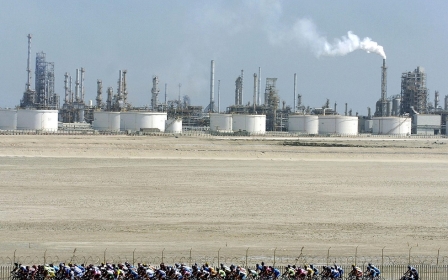Qatar economic outlook lowered as Gulf demands deadline passes

A ratings agency downgraded Qatar's economic outlook, as a deadline for the country to meet demands imposed by its Gulf neighbours passed on Wednesday.
Saudi Arabia and Arab allies that have cut ties with Qatar will hold talks in Egypt on Wednesday on the Gulf diplomatic crisis, after Doha said their demands were impossible to meet.
The four Arab nations, which also include the United Arab Emirates, Bahrain and Egypt, accuse Qatar of supporting "extremism", a charge which it denies.
They gave the isolated emirate an extra 48 hours to meet their ultimatum after an initial 10-day deadline passed on Sunday. That extended deadline passed early on Wednesday morning.
Early on Wednesday the ratings agency Moody's said “the likelihood of a prolonged period of uncertainty extending into 2018 has increased and a quick resolution of the dispute is unlikely over the next few months”.
It's not about terrorism, it's talking about shutting down the freedom of speech
- Mohammed bin Abdulrahman Al-Thani, Qatari Foreign Minister
The turmoil “carries the risk that Qatar’s sovereign credit fundamentals could be negatively affected”.
It added, however, that Qatar's exports of natural gas had yet to be affected.
Saudi Arabia said early Wednesday the four had received Qatar's response and that they would respond "at the right time".
Foreign ministers from the four countries that broke off diplomatic and trade relations with Qatar are due to meet in Cairo from 1100 GMT on Wednesday. A press conference is expected afterwards.
Qatari Foreign Minister Sheikh Mohammed bin Abdulrahman Al-Thani handed an official response on Monday to Kuwait, which is mediating in the dispute, but its contents have not been disclosed.
Doha has said it will not bow to pressure and that the demands seem designed to be rejected.
Sheikh Mohammed told a press conference on Tuesday that the list of demands from the four countries "is unrealistic and is not actionable".
"It's not about terrorism, it's talking about shutting down the freedom of speech," he said.
The demands include Doha ending support for the Muslim Brotherhood, closing broadcaster Al-Jazeera, downgrading diplomatic ties with Iran and shutting down a Turkish military base in the emirate.
Riyadh and its supporters have severed air, sea and ground links with Qatar, cutting off vital routes for imports including food.
They also ordered Qatari citizens to leave their territories and took various steps against Qatari firms and financial institutions.
'Trying to act mature'
Sheikh Mohammed said Doha was looking for a solution to the month-long crisis based on dialogue.
"The state of Qatar has adopted a very constructive attitude since the beginning of the crisis. We are trying to act mature and discuss the matter."
The four countries have suggested further sanctions could be imposed if Doha does not comply.
Riyadh and its allies have also accused Doha of being too close to their regional arch-rival Iran.
The crisis has raised concerns of growing instability in the region, home to some of the world's largest energy exporters and key Western allies who host US military bases.
Qatar is the world's leading producer of liquefied natural gas and on Tuesday state-owned Qatar Petroleum said it was planning a significant production increase over the coming years.
The country's gas riches have transformed it in recent years into one of the world's wealthiest countries, a major international investor and a regional player that will host the 2022 football World Cup.
Qatar has also pursued a more independent foreign policy than many of its neighbours, who tend to follow the lead of regional powerhouse Saudi Arabia.
UAE Foreign Minister Sheikh Abdullah bin Zayed al-Nahyan said on Tuesday it was "premature" to discuss what further action might be taken against Qatar.
Any measures that are taken will be "within the framework of international law", Sheikh Abdullah said.
"Any independent state has the right to take measures against any party," he added, urging Doha to listen to "the voice of reason and wisdom".
Stay informed with MEE's newsletters
Sign up to get the latest alerts, insights and analysis, starting with Turkey Unpacked
Middle East Eye delivers independent and unrivalled coverage and analysis of the Middle East, North Africa and beyond. To learn more about republishing this content and the associated fees, please fill out this form. More about MEE can be found here.




